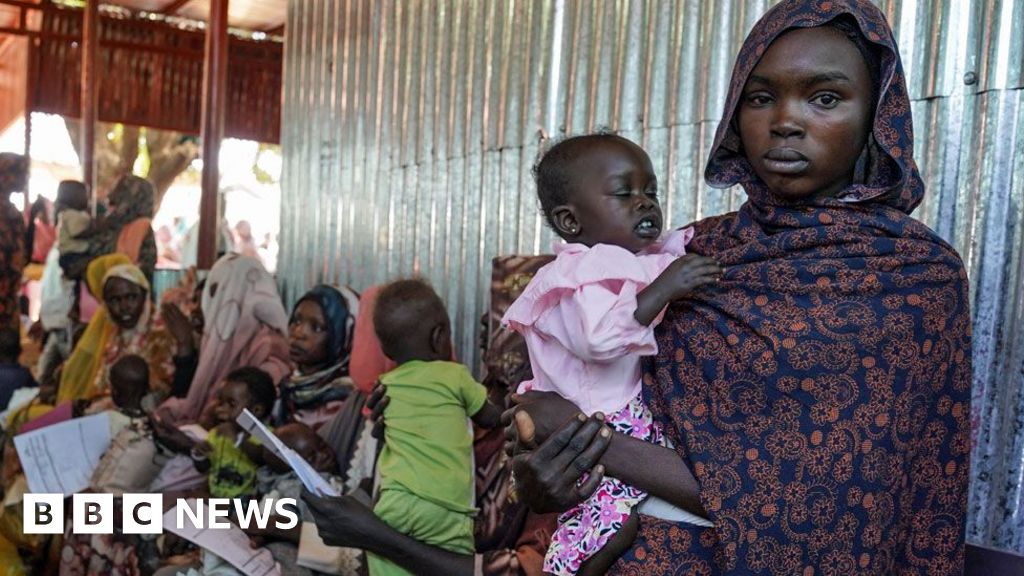The civil war in Sudan has pushed a camp housing about 500,000 displaced people near the besieged Darfur city of el-Fasher into famine, an independent group of food security experts says.
The 16-month conflict and restrictions on aid deliveries were to blame, the Famine Review Committee (FRC) concluded after looking at new data.
“The scale of devastation brought by the escalating violence in el-Fasher is profound and harrowing,” it said, explaining how Zamzam camp's population had ballooned since April.
The war - a power struggle between the army and the paramilitary Rapid Support Forces (RSF) - has created the world's largest humanitarian crisis forcing 10 million people from their homes.
It comes as US-mediated talks, scheduled to begin in two weeks, appear to be in jeopardy.
The RSF has accepted the invitation to Geneva, but it is unclear whether the army will go following Wednesday’s alleged assassination attempt on military leader Gen Abdel Fattah al-Burhan.
“The main drivers of famine in Zamzam camp are conflict and lack of humanitarian access, both of which can immediately be rectified with the necessary political will,” the FRC said.
The committee, linked to the Integrated Food Security Phase Classification (IPC) - a global initiative by UN agencies, aid groups and governments which identifies famine conditions - analysed two reports:
- The IPC’s Sudan working group’s latest assessment, which says 25.6 million people, or 54% of the population, are in high levels of acute food insecurity with 14 areas at risk of famine and
- Data published on Thursday from a US agency, the Famine Early Warning Systems Network (Fews Net).
Fews Net said it was possible that famine was also ongoing in Abu Shouk and Al Salam camps, also near el-Fasher, but there was not enough evidence to conclusively say so.
The conditions for classifying an area to be in famine are that at least 20% of households must be facing an extreme lack of food, with 30% of children acutely malnourished and two people out of every 10,000 dying daily from starvation or from malnutrition and disease.
Since April the RSF has been battling to take el-Fasher from the army, the only city still under military control in the western region of Darfur.
According to the FRC, around 320,000 people are believed to have fled the city, with around 150,000 to 200,000 moving to Zamzam camp “in search of security, basic services and food” in just a few weeks in May.
That month the UN expert on genocide prevention said many civilians in el-Fasher were being targeted based on their ethnicity - warning that there was a growing risk of genocide.
The violence in Darfur is similar to the ethnic cleansing unleashed by Arab Janjaweed militias on non-Arab communities two decades ago.
The main market in Zamzam camp was now only open intermittently and by June prices had rocketed - by 63% for cooking oil, 190% for sugar, 67% for millet and 75% for rice, the FRC said, giving a glimpse in its 47-page report into what conditions are like in the crowded camp.
Famine conditions prevailed in June and July and were likely to persist until October - the harvest season.
However, the experts fear that the hunger crisis will not ease much as war has prevented many farmers from planting.
The dire situation revealed by the reports about el-Fasher, particularly in Zamzam camp, was “merely the tip of the iceberg”, Barrett Alexander, from the aid agency Mercy Corps, warned.
“Drawing from our experience with previous famines, we know that widespread deaths have already occurred by the time a famine is officially declared.”
He added that a recent Mercy Corps assessment in Central and South Darfur had revealed that nine out of 10 children were suffering from life-threatening malnutrition.
One of the last aid groups operating in el-Fasher, Médecins Sans Frontières (MSF), said things were likely to get worse if an apparent blockade on humanitarian aid was not lifted urgently.
“Our trucks left N’Djamena in Chad over six weeks ago and they should have reached el-Fasher by now, but we have no idea when they will be released,” said MSF’s Stéphane Doyon, MSF's head of emergencies in Sudan.
The warring sides have both been accused of blocking and looting aid and both deny the allegations.
The MSF lorries are carrying therapeutic food and medical supplies for children in Zamzam camp as well as surgical supplies for the last remaining hospital in el-Fasher that does surgery.
The Saudi Hospital was hit by shelling on Monday that killed three staff and injured at least 25 people - the 10th attack in under three months, the charity said.
“We do not know if hospitals are being intentionally targeted, but the incident on Monday shows that the belligerents are not taking any precautions to spare them,” Mr Doyon said.
Additional reporting by the BBC's Anne Soy.
